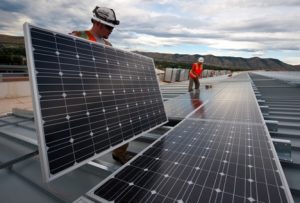Solar energy is one of the most important sources of clean, renewable energy. It is recognized as a cost-effective and environmentally friendly source of electrical power generation.
The average home uses between 5 to 8% of their monthly income for electricity bills. Solar system installation can provide significant savings on your electricity bill and cut down CO2 emissions by 100lbs per year for each household. So if you already have a house or plan to build one in the future on your off-plan property, this article will serve as a homeowner’s guide to solar energy installs and its benefits. It will help you understand why you need to install solar panels in your home.
Solar energy is environmentally friendly.
Solar energy is clean and reliable; there are no greenhouse gas emissions and other harmful pollutants instead of conventional fossil fuel-generated electricity from a solar system. The solar cells don’t contain any part of toxic waste that can be disposed of in landfills or anywhere where it might endanger the environment or human health. The solar systems don’t emit noise, noxious fumes, and other pollutants contributing to global warming.
Solar energy is relatively cheap.
There is a widespread misconception about solar energy – that it’s expensive and only for those who can afford the initial expense. In actual fact, the amount of money you will save in fuel costs over time means that installing a solar panel system will actually generate an income. The money saved is directly related to the size and type of array installed on your home.
Solar energy is safe and durable.
The investment in a solar system is not only green. It’s also safe. The solar arrays do not produce any dangerous or toxic emissions to humans or animals as no toxic fumes or chemicals can cause harm. The solar cells are highly durable, and the only component of a system that might degrade over time is the glass on solar panels.
Solar energy system benefits are offered for by the government.
The government is offering several tax breaks and benefits to individuals, families, and businesses planning to install solar panels on their properties. Government incentives include 30%-40% cash rebates for the purchase of a solar system in addition to federal state grant programs that can fund up to 50% of the project costs. Several funds can assist in reducing the costs of a solar array, such as loans, grants, and rebates.
Solar energy prevents photovoltaic production.
Solar systems save money on electrically bills by producing sunlight through the photovoltaic effect without burning any fuel. Photovoltaics have become one of the most popular forms of renewable energy, with many countries installing solar systems to reduce dependence on fossil fuels.
How do solar panels work?
The solar panel arrays are interconnected solar cells that convert sunlight into energy with an efficiency level of about 16% – 20%. These panels combine to form a solar array that generates enough electricity for the entire home or commercial properties such as hospitals, schools, and hotels.

Bottom Line
When installing a solar panel system on your home, you must do thorough research and due diligence in finding a reputable company or expert who can provide you with quality work.
The most compelling aspect of solar panels for many people is the financial savings they provide. However, some also find it satisfying to generate clean electricity and contribute less pollution to our environment.
We hope you’ve enjoyed this ultimate guide to a homeowner’s understanding of electrical power generation, solar energy installs, and its benefits! If you’re planning to make the switch, click the “Free Quote” button below to get free estimate and assistance from a local contractor!
